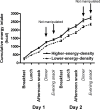The relationship between dietary energy density and energy intake
- PMID: 19303887
- PMCID: PMC4182946
- DOI: 10.1016/j.physbeh.2009.03.011
The relationship between dietary energy density and energy intake
Abstract
Much of the research in ingestive behavior has focused on the macronutrient composition of foods; however, these studies are incomplete, or could be misleading, if they do not consider the energy density (ED) of the diet under investigation. Lowering the ED (kcal/g) by increasing the volume of preloads without changing macronutrient content can enhance satiety and reduce subsequent energy intake at a meal. Ad libitum intake or satiation has also been shown to be influenced by ED when the proportions of macronutrients are constant. Since people tend to eat a consistent weight of food, when the ED of the available foods is reduced, energy intake is reduced. The effects of ED have been seen in adults of different weight status, sex, and behavioral characteristics, as well as in 3- to 5-year-old children. The mechanisms underlying the response to variations in ED are not yet well understood and data from controlled studies lasting more than several days are limited. However, both population-based studies and long-term clinical trials indicate that the effects of dietary ED can be persistent. Several clinical trials have shown that reducing the ED of the diet by the addition of water-rich foods such as fruits and vegetables was associated with substantial weight loss even when patients were not told to restrict calories. Since lowering dietary energy density could provide effective strategies for the prevention and treatment of obesity, there is a need for more studies of mechanisms underlying the effect and ways to apply these findings.
Figures




References
-
- Rolls BJ, Castellanos VH, Halford JC, Kilara A, Panyam D, Pelkman CL, Smith GP, Thorwart ML. Volume of food consumed affects satiety in men. Am J Clin Nutr. 1998;67:1170–1177. - PubMed
-
- Rolls BJ, Bell EA, Thorwart ML. Water incorporated into a food but not served with a food decreases energy intake in lean women. Am J Clin Nutr. 1999;70:448–455. - PubMed
-
- Bell EA, Roe LS, Rolls BJ. Sensory-specific satiety is affected more by volume than by energy content of a liquid food. Physiol Behav. 2003;78:593–600. - PubMed
-
- Rolls BJ, Roe LS. Effect of the volume of liquid food infused intragastrically on satiety in women. Physiol Behav. 2002;76:623–631. - PubMed
Publication types
MeSH terms
Grants and funding
LinkOut - more resources
Full Text Sources
Medical

